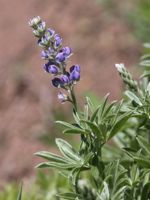Mon-Fri 9am - 5pm Mountain time
Black-Eyed Susan vs Silky Lupine
Rudbeckia hirta
Lupinus sericeus
NOT AVAILABLE THIS SEASON - MIGHT RETURN
CUSTOM GROW
Black-Eyed Susan is a striking native wildflower known for its bright yellow, daisy-like flowers with dark center disks. With deadheading, the plant can bloom for an extended period, from mid-summer to early fall. These cheerful flowers attract a variety of pollinators, including bees and butterflies. Adding to its ecological value, the plant also acts as a host for the Wavy-Lined Emerald Moth (Synchlora aerata) and the Silvery Checkerspot (Chlosyne nycteis) butterfly.
While it is typically a short-lived perennial or biennial, the plant freely self-seeds. This allows it to persist in the landscape, particularly in natural areas where it can spread and establish itself. This plant is drought-tolerant, salt-tolerant, and deer and rabbit-resistant, making it ideal for challenging environments. The Black-Eyed Susan is well suited to wildflower gardens, pollinator gardens, as well as slopes, banks, and naturalized areas.
Silky Lupine is a native perennial wildflower known for its upright spikes of blue to violet flowers. Blooming from late spring into summer, the nectar-rich, showy blossoms attract a variety of pollinators, especially bees and butterflies. The plant’s fine, silky foliage provides soft texture and visual interest, enhancing landscapes throughout the growing season.
Silky Lupine is a nitrogen-fixing plant that enriches soils and supports surrounding vegetation. Its deep roots stabilize soil, and it spreads naturally by ejecting seeds from drying pods. If spread isn’t desired, new seedlings are easy to remove. While it is foraged by some wild animals, it contains alkaloids that are toxic to livestock. Silky Lupine is well-suited to pollinator gardens, naturalization plantings, erosion control, and ecological restoration projects.
Black-Eyed Susan Quick Facts
Silky Lupine Quick Facts
Toxicity: toxic to sheep and other livestock

